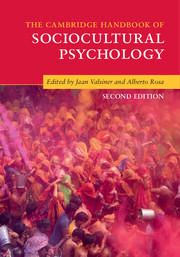The Cambridge Handbook of Sociocultural Psychology (2nd Ed., Revised edition) Cambridge Handbooks in Psychology Series
Langue : Anglais
Coordonnateurs : Rosa Alberto, Valsiner Jaan

Explains how human actions, mediated with cultural artefacts within social practices, produce meaningful personal experiences and shape behaviour.
Sociocultural psychology is a discipline located at the crossroads between the natural and social sciences and the humanities. This international overview of the field provides an antireductionist and comprehensive account of how experience and behaviour arise from human action with cultural materials in social practices. The outcome is a vision of the dynamics of sociocultural and personal life in which time and developmental constructive transformations are crucial. This second edition provides expanded coverage of how particular cultural artefacts and social practices shape experience and behaviour in the realms of art and aesthetics, economics, history, religion and politics. Special attention is also paid to the development of identity, the self and personhood throughout the lifespan, while retaining the emphasis on experience and development as key features of sociocultural psychology.
Editors' introduction: sociocultural psychology on the move; Part I. Theoretical and Methodological Issues: 1. The human psyche lives in semiospheres; 2. Psychology as the science of sensemaking: A semiotic-cultural framework for psychology; 3. Knowledge and experience: interobjectivity, subjectivity and social relations; 4. Against 'mediationism': both cognitive and sociocultural; 5. Sociocultural psychology and interpersonal psychoanalysis: the semiotic space in the consulting room; Part II. Action, Objects, Artefacts and Meaning: 6. Spirited psyche makes up artefacts. Semiotic dynamics of experience in the shaping of objects, agency and intentional worlds; 7. Making social objects: the theory of social representation; 8. Beyond the distinction between tool and sign: objects and artifacts in human activity; 9. The sociocultural study of creative action; 10. Symbolic resources and imagination in the dynamics of life; Part III. The Agent Rises a Reflective Self: Education and Development: 11. Early infancy: a moving world. Embodied experience and the emergence of thinking; 12. Object Pragmatics: Culture and communication, the bases for early cognitive development; 13. Distinguishing two processes of self-reflection Alex Gillespie; 14. Making memory: meaning in development of the autobiographical self; 15. Mapping dialogic pedagogy: instrumental and non-instrumental education; 16. Development and education as crossing socio-cultural boundaries; Part IV. Institutional Artefacts for Value: 17. Ownership and exchange in children. Implications for social and moral development; 18. Possessions and money beyond market economy; Part V. Aesthetic and Religious Experiences: 19. The sociocultural constitution of aesthetic transcendence; 20. Sociocultural science of religion and natural belief; 21. Psyche and Religio face to face: religion, psychology and modern, subjectivity in the mirror; Part VI. Practices and Artefacts for Imagining Identity: 22. Imaginative processes and the making of collective realities in national allegories; 23. National identities in the making and alternative pathways for history education; 24. The politics of representing the past: symbolic spaces of positioning and irony; 25. Beyond historical guilt: intergenerational narratives of violence and reconciliation; 26. Psytizenship: sociocultural mediations in the historical shapings of the Western citizen; Part VII. Experiences Make the Person: 27. The human experience: a dialogical account of self and feelings; 28. Knowing ourselves: dances of social guidance, imagination and development by overcoming ambivalence; 29. Personal history and historical selfhood – the embodied and pre-reflective dimension; 30. The development of a person – children's experience within the cultural life course; 31. The construction of the person in the interethnic situation: dialogues with indigenous university students; 32. Social identities, gender and self: cultural canalization in imagery societies; 33. The experience of ageing: views from within and without; General conclusions; An epistemological coda: sociocultural psychology among the sciences.
Alberto Rosa is Professor of Psychology at the Universidad Autónoma de Madrid, where he lectures on history of psychology and cultural psychology. He has carried out research and edited books on the developmental psychology of the physically challenged, notably Psicología de la Ceguera (1993) and El Niño con Parálisis Cerebral (1993), as well as on the history of psychology, such as his Metodología de la Historia de la Psicología (1996) and Historical and Theoretical Discourse (1994, co-authored with Jaan Valsiner). His most recent publication, Hacer(se) Ciudadan@s: Una Psicología para la Democracia (2015), is about the influence of culture and history in shaping identity and citizenship.
Jaan Valsiner is the Niels Bohr Professor of Cultural Psychology at Aalborg University, Denmark. He was the founding editor of the journal Culture and Psychology, and he has published and edited around 40 books, including The Guided Mind (1998), Culture in Minds and Societies (2007) and Invitation to Cultural Psychology (2014). He was awarded the 1995 Alexander von Humboldt Prize and the 2017 Hans Kilian Prize for his interdisciplinary work on human development, as well as the Senior Fulbright Lecturing Award in Brazil 1995–1997. He has been a visiting professor in Brazil, Japan, Australia, Estonia, Germany, Italy, Luxembourg, the United Kingdom and the Netherlands.
Jaan Valsiner is the Niels Bohr Professor of Cultural Psychology at Aalborg University, Denmark. He was the founding editor of the journal Culture and Psychology, and he has published and edited around 40 books, including The Guided Mind (1998), Culture in Minds and Societies (2007) and Invitation to Cultural Psychology (2014). He was awarded the 1995 Alexander von Humboldt Prize and the 2017 Hans Kilian Prize for his interdisciplinary work on human development, as well as the Senior Fulbright Lecturing Award in Brazil 1995–1997. He has been a visiting professor in Brazil, Japan, Australia, Estonia, Germany, Italy, Luxembourg, the United Kingdom and the Netherlands.
Date de parution : 07-2018
Ouvrage de 690 p.
17.5x24.5 cm
Thème de The Cambridge Handbook of Sociocultural Psychology :
© 2024 LAVOISIER S.A.S.



